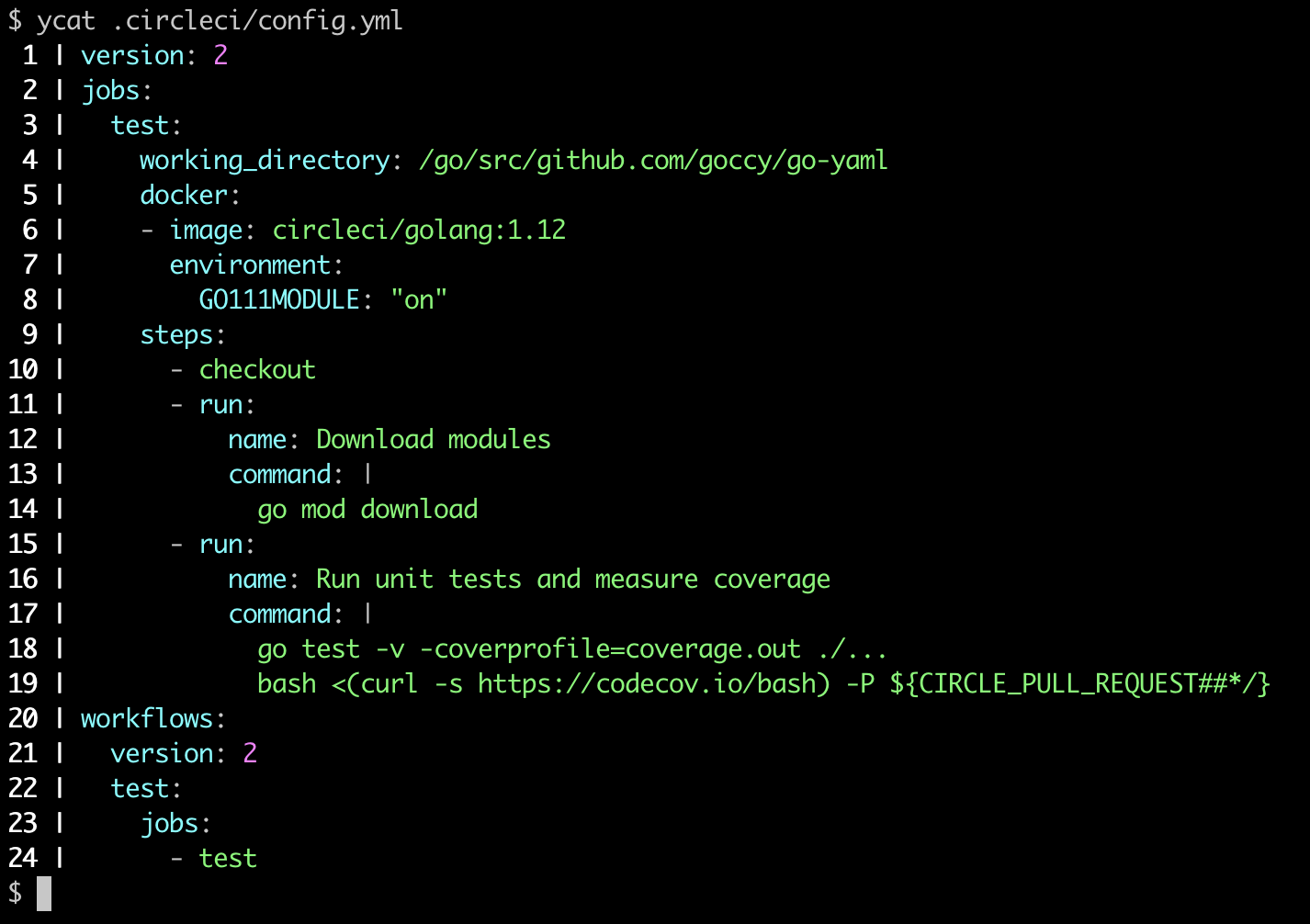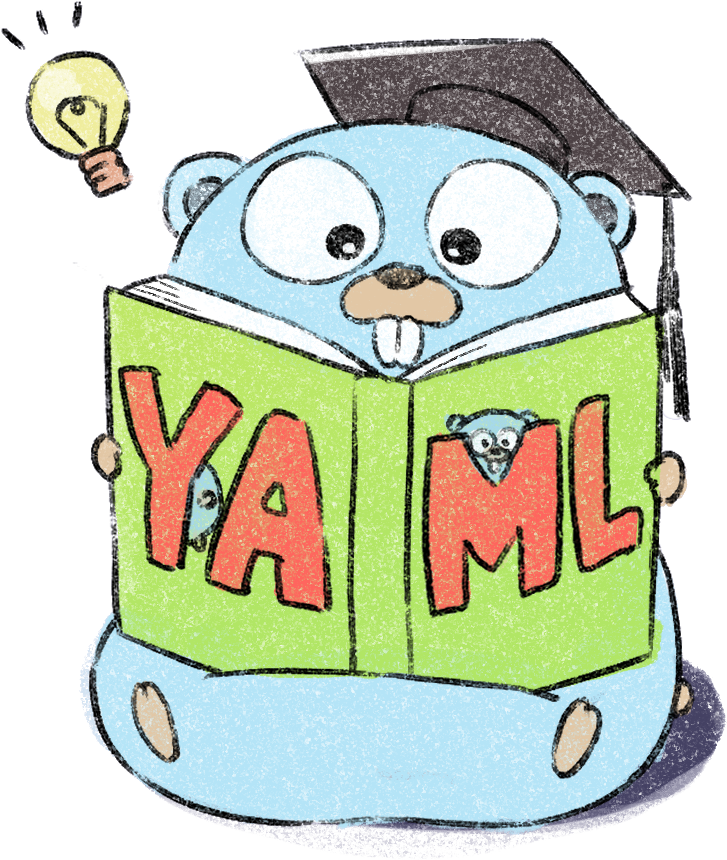goccy / Go Yaml
Labels
Projects that are alternatives of or similar to Go Yaml
YAML support for the Go language
Why a new library?
As of this writing, there already exists a defacto standard library for YAML processing Go: https://github.com/go-yaml/yaml. However we feel that some features are lacking, namely:
- Pretty format for error notifications
- Directly manipulate the YAML abstract syntax tree
- Support
AnchorandAliaswhen marshaling - Allow referencing elements declared in another file via anchors
Features
- Pretty format for error notifications
- Support
ScannerorLexerorParseras public API - Support
AnchorandAliasto Marshaler - Allow referencing elements declared in another file via anchors
- Extract value or AST by YAMLPath ( YAMLPath is like a JSONPath )
Installation
go get -u github.com/goccy/go-yaml
Synopsis
1. Simple Encode/Decode
Support compatible interface to go-yaml/yaml by using reflect
var v struct {
A int
B string
}
v.A = 1
v.B = "hello"
bytes, err := yaml.Marshal(v)
if err != nil {
//...
}
fmt.Println(string(bytes)) // "a: 1\nb: hello\n"
yml := `
%YAML 1.2
---
a: 1
b: c
`
var v struct {
A int
B string
}
if err := yaml.Unmarshal([]byte(yml), &v); err != nil {
//...
}
To control marshal/unmarshal behavior, you can use the yaml tag
yml := `---
foo: 1
bar: c
`
var v struct {
A int `yaml:"foo"`
B string `yaml:"bar"`
}
if err := yaml.Unmarshal([]byte(yml), &v); err != nil {
//...
}
For convenience, we also accept the json tag. Note that not all options from
the json tag will have significance when parsing YAML documents. If both
tags exist, yaml tag will take precedence.
yml := `---
foo: 1
bar: c
`
var v struct {
A int `json:"foo"`
B string `json:"bar"`
}
if err := yaml.Unmarshal([]byte(yml), &v); err != nil {
//...
}
For custom marshal/unmarshaling, implement either Bytes or Interface variant of marshaler/unmarshaler. The difference is that while BytesMarshaler/BytesUnmarshaler behaves like encoding/json and InterfaceMarshaler/InterfaceUnmarshaler behaves like gopkg.in/yaml.v2.
Semantically both are the same, but they differ in performance. Because indentation matter in YAML, you cannot simply accept a valid YAML fragment from a Marshaler, and expect it to work when it is attached to the parent container's serialized form. Therefore when we receive use the BytesMarshaler, which returns []byte, we must decode it once to figure out how to make it work in the given context. If you use the InterfaceMarshaler, we can skip the decoding.
If you are repeatedly marshaling complex objects, the latter is always better performance wise. But if you are, for example, just providing a choice between a config file format that is read only once, the former is probably easier to code.
2. Reference elements in declared in another file
testdata directory includes anchor.yml file
├── testdata
└── anchor.yml
And anchor.yml is defined the following.
a: &a
b: 1
c: hello
Then, if yaml.ReferenceDirs("testdata") option passed to yaml.Decoder,
Decoder try to find anchor definition from YAML files the under testdata directory.
buf := bytes.NewBufferString("a: *a\n")
dec := yaml.NewDecoder(buf, yaml.ReferenceDirs("testdata"))
var v struct {
A struct {
B int
C string
}
}
if err := dec.Decode(&v); err != nil {
//...
}
fmt.Printf("%+v\n", v) // {A:{B:1 C:hello}}
3. Encode with Anchor and Alias
3.1. Explicitly declaration Anchor name and Alias name
If you want to use anchor or alias, you can define it as a struct tag.
type T struct {
A int
B string
}
var v struct {
C *T `yaml:"c,anchor=x"`
D *T `yaml:"d,alias=x"`
}
v.C = &T{A: 1, B: "hello"}
v.D = v.C
bytes, err := yaml.Marshal(v)
if err != nil {
panic(err)
}
fmt.Println(string(bytes))
/*
c: &x
a: 1
b: hello
d: *x
*/
3.2. Implicitly declared Anchor and Alias names
If you do not explicitly declare the anchor name, the default behavior is to
use the equivalent of strings.ToLower($FieldName) as the name of the anchor.
If you do not explicitly declare the alias name AND the value is a pointer to another element, we look up the anchor name by finding out which anchor field the value is assigned to by looking up its pointer address.
type T struct {
I int
S string
}
var v struct {
A *T `yaml:"a,anchor"`
B *T `yaml:"b,anchor"`
C *T `yaml:"c,alias"`
D *T `yaml:"d,alias"`
}
v.A = &T{I: 1, S: "hello"}
v.B = &T{I: 2, S: "world"}
v.C = v.A // C has same pointer address to A
v.D = v.B // D has same pointer address to B
bytes, err := yaml.Marshal(v)
if err != nil {
//...
}
fmt.Println(string(bytes))
/*
a: &a
i: 1
s: hello
b: &b
i: 2
s: world
c: *a
d: *b
*/
3.3 MergeKey and Alias
Merge key and alias ( <<: *alias ) can be used by embedding a structure with the inline,alias tag .
type Person struct {
*Person `yaml:",omitempty,inline,alias"` // embed Person type for default value
Name string `yaml:",omitempty"`
Age int `yaml:",omitempty"`
}
defaultPerson := &Person{
Name: "John Smith",
Age: 20,
}
people := []*Person{
{
Person: defaultPerson, // assign default value
Name: "Ken", // override Name property
Age: 10, // override Age property
},
{
Person: defaultPerson, // assign default value only
},
}
var doc struct {
Default *Person `yaml:"default,anchor"`
People []*Person `yaml:"people"`
}
doc.Default = defaultPerson
doc.People = people
bytes, err := yaml.Marshal(doc)
if err != nil {
//...
}
fmt.Println(string(bytes))
/*
default: &default
name: John Smith
age: 20
people:
- <<: *default
name: Ken
age: 10
- <<: *default
*/
4. Pretty Formatted Errors
Error values produced during parsing has two extra features over regular error values.
First by default they contain extra information on the location of the error from the source YAML document, to make it easier finding the error location.
Second, the error messages can optionally be colorized.
If you would like to control exactly how the output looks like, consider
using yaml.FormatError, which accepts two boolean values to
control turning on/off these features
5. Use YAMLPath
yml := `
store:
book:
- author: john
price: 10
- author: ken
price: 12
bicycle:
color: red
price: 19.95
`
path, err := yaml.PathString("$.store.book[*].author")
if err != nil {
//...
}
var authors []string
if err := path.Read(strings.NewReader(yml), &authors); err != nil {
//...
}
fmt.Println(authors)
// [john ken]
5.1 Print customized error with YAML source code
package main
import (
"fmt"
"github.com/goccy/go-yaml"
)
func main() {
yml := `
a: 1
b: "hello"
`
var v struct {
A int
B string
}
if err := yaml.Unmarshal([]byte(yml), &v); err != nil {
panic(err)
}
if v.A != 2 {
// output error with YAML source
path, err := yaml.PathString("$.a")
if err != nil {
panic(err)
}
source, err := path.AnnotateSource([]byte(yml), true)
if err != nil {
panic(err)
}
fmt.Printf("a value expected 2 but actual %d:\n%s\n", v.A, string(source))
}
}
output result is the following.
Tools
ycat
print yaml file with color

Installation
go get -u github.com/goccy/go-yaml/cmd/ycat
License
MIT



